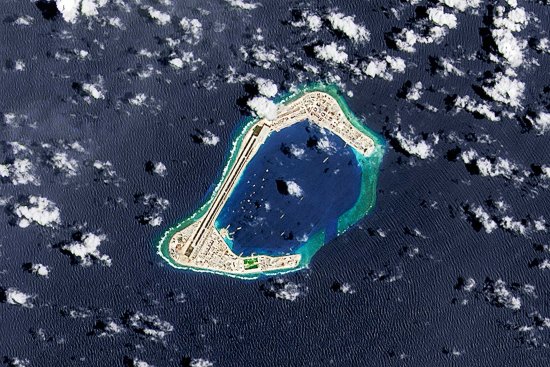
Donald Trump's victory may hasten a retreat from the region
In 2015, a satellite spied barges owned by one of the world’s biggest dredging companies, China Communications Construction Co. (CCCC), working at disputed reefs in the South China Sea. The Chinese were busy converting bits of contested rock into seven artificial islands, much to the chagrin of the five other governments with competing claims over the western Pacific Ocean. Admiral Harry Harris Jr., head of the U.S. Pacific Command, criticized China’s island-building campaign, which includes military-ready runways and radar nests, calling it “a Great Wall of sand with dredges and bulldozers.” In July 2016, an international tribunal dismissed Beijing’s vast claims over the South China Sea. No matter. China’s new islands will not be unmade.
CCCC will soon begin more reclamation work in the western Pacific. This time, its crews will be dredging in the Philippines, the longtime U.S. ally that, until recently, had staunchly opposed China’s maritime construction. But in October, amid a flurry of deals made during new Philippine President Rodrigo Duterte’s trip to Beijing, CCCC won a contract to develop a harbor in Davao City, Duterte’s hometown where he was once mayor. While in China, Duterte, who took office this past June, announced the Philippines’ “separation” from the U.S., proclaiming that in the military and economic spheres, “America has lost.” Chinese state-owned companies seized the opportunity. “We are devoted,” says CCCC spokesperson Mi Jinsheng, “to making the world more open.”
[time-brightcove not-tgx=”true”]Duterte’s decision to cozy up to China happened even before Donald Trump was elected U.S. President following an “America first” campaign that embraced isolationism and protectionism. Despite Barack Obama’s efforts to tilt American foreign policy back toward the Asia-Pacific, most of the region has been pulled into China’s economic orbit. Now, as the President-elect keeps the world guessing on his future statecraft–Might he upend the delicate diplomacy between China and Taiwan, or perhaps spark a trade war?–a larger question has emerged: Has America lost Asia?
For seven decades, as the continent rose from the ashes of World War II, Pax Americana helped keep the peace in Asia. In the Pacific, the U.S. Seventh Fleet ruled the waves, ensuring that container ships could ferry cheap exports abroad and thereby lift hundreds of millions of Asians out of poverty. On land, tens of thousands of U.S. troops died in Vietnam and Korea. Asia’s socialist soldiers did not directly menace American territory, but American values were offended. Each of Asia’s communist dominoes, U.S. generals and foreign policy advisers worried, could threaten the U.S.-led global order. Through a network of security alliances–five of America’s seven collective defense treaties are with partners in the Asia-Pacific–the U.S. military tied itself to the world’s most populous region, which today produces nearly 40% of global economic growth.
Yet Trump’s victory–not to mention Brexit and the rise of the far right across Europe–bespeaks a global turn inward, a preference for tribe over trade. For many in the U.S., globalization has become a dirty word. Yet Asia has thrived precisely because of America’s defense of the rules of global commerce. It is an irony of history that China–the biggest beneficiary of this U.S.-led order–is now poised to challenge postwar U.S. leadership in the Asia-Pacific. At the Asia-Pacific Economic Cooperation summit in Lima in November, New Zealand’s then Prime Minister John Key put it plainly. “We like the U.S. being in the region,” he said. “But if the U.S. is not there, that void needs to be filled, and it will be filled by China.”
During his four years in power, China’s leader, Xi Jinping, has preached about a “Chinese dream”–stable authoritarianism married with personal enterprise–that could supplant an American ideal of democracy and international law. As the U.S. has withdrawn from regional trade initiatives, China is offering up alternatives. Most of Asia now counts China as its largest trading partner, a return to the continent’s natural order for centuries. Beijing’s footprint is growing fast. In Indonesia in 2016, to take just one example, Chinese foreign direct investment is set to nearly triple year-on-year. Thailand’s economy depends on Chinese tourists, while massive South Asian ports are being developed to service Chinese trade. With Duterte’s Beijing deals in play, China is likely to surpass the U.S. as the Philippines’ biggest investor next year.
Some of the countries drifting toward China are doing so as much out of personal politics as economic necessity. Duterte famously nurses an animus toward America, which once colonized the Philippines. Malaysia’s Prime Minister, Najib Razak, has been tainted by allegations of corruption involving a national development fund–allegations that he has denied and which local authorities have cleared him of. However, eight governments, including the U.S., are investigating assets in their countries linked to the fund. Not surprisingly, Najib, who used to golf with Obama, has tacked away from America, racking up more than $30 billion in deals during a November trip to Beijing.
It’s unclear how much Beijing wants to play superpower. Being the world’s policeman is expensive and exhausting. China is only now building its first overseas military outpost, a tiny base in Djibouti. Nor is it certain that a Trump Cabinet, stocked with military brass and conservatives leery of communism, will retreat from the Asia-Pacific. So far, Chinese foreign policy has been more about Beijing pursuing its perceived national interests–the South China Sea, say, or Taiwan–than articulating some grand ideological narrative. China, says Elizabeth Economy, director for Asia studies at the Council on Foreign Relations in New York, “has no standing as a guarantor of regional security or builder of strong institutions of good governance in the developing nations of Asia.”
Chinese state-media sniping that American democracy is messy and unpredictable is not the same as presenting a workable alternative to the current global order. And for all of America’s inattention or hypocrisy in supporting regional strongmen, the U.S. has made modern Asia a safer and richer place. That landscape–and legacy–will not be easily covered over by Chinese sand.